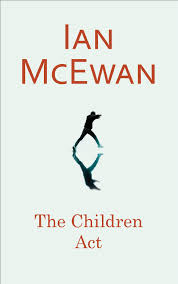Fiona Maye is a leading High Court judge, presiding over cases in the family court. She is renowned for her fierce intelligence, exactitude and sensitivity. But her professional success belies private sorrow and domestic strife. There is the lingering regret of her childlessness, and now, her marriage of thirty years is in crisis.
At the same time, she is called on to try an urgent case: for religious reasons, a beautiful seventeen-year-old boy, Adam, is refusing the medical treatment that could save his life, and his devout parents share his wishes. Time is running out. Should the secular court overrule sincerely held faith? In the course of reaching a decision Fiona visits Adam in hospital – an encounter which stirs long-buried feelings in her and powerful new emotions in the boy. Her judgment has momentous consequences for them both.
Difficult to summarise, or to review, McEwan’s book (his 13th novel) draws on his personal experience with the family courts during a difficult divorce and custody battle in the 1990s. He had an uncomfortable interruption at the Cheltenham Literary Festival this year when his ex-wife began shouting about the injunction, which was placed forbidding her to speak about the case. This awkwardness and emotional turmoil is brought out painfully but carefully in the book: the sense of uncertainty and betrayal is beautifully illustrated, touching on emotions of difficulty in all of our lives. His ability to translate the complexities of emotion, and especially the difficulties of vulnerability in relationships, never fails to hold my attention. The novella, On Chesil Beach, was one of his most powerful books, in my opinion, and he uses the same mood, painting a landscape of fear and abandonment. One of the aspects of McEwan’s writing that I most admire is his ability get inside the mind of a character at their most vulnerable. He poses questions in his fiction that might otherwise be difficult to voice.
The main event in the story centres around a seventeen (nearly eighteen year old) son of a Jehovah’s Witness couple. The significance of his age and of the closeness to his eighteenth birthday becomes apparent as we get deeper into the story. The book covers themes of religion, personal faith and human rights law, and the legal aspect of the book was really interesting. Without showing much bias, he forces the reader to come to their own conclusions about the right or wrong or the family’s belief systems, and raises questions about how or why we come to the various and necessary decisions in our lives. I felt for each character for different reasons, and am left with a sense of having lived the lives of many of the characters.

I’ve just read it (review to follow soon). I’m not sure it’s his best – I think Enduring Love was more powerful – but still compelling.
LikeLike
I agree, but I still really enjoyed it. Haven’t yet read Enduring Love. Will look forward to your thoughts on The Children Act. F
LikeLike
I haven’t read this yet and have seen mixed reviews, so interested to see your endorsement. He is so good, as you say, at addressing the vulnerability in relationships.
And I’ll admit, I enjoyed the gossip about the intrusion at the literary festival, though probably would have been excruciating to have been there.
LikeLike
I can understand the mixed response, and the ending was a little weaker than I expected. I think he took the easy way out (but I won’t spoil the plot). Overall, though, it is still mulling in my mind and I feel changed by it, in that it has prompted me to think more about the issues surrounding the main themes. The way he tackled JW beliefs was sensitively done.
LikeLike
I really liked it – the best thing, i agree, was the characterisation, especially of the judge and her marriage. I also loved On Chesil Beach and agree the atmosphere was similar. I do admire a short book done well too.
I didn’t know about the marriage problems he’d had either, until after I read the book (when I read something about the heckling) – so that part didn’t seem pointed or autobiographical at the time.
LikeLike
I appreciated the fact that she was a female judge, with all of the usual pressures to have a family and to juggle the expectations of others. His characterisation and imagery is powerful.
I knew a little about his relationship history, but the heckling was news to me. I discovered an article about the Cheltenham Literary Festival after reading the book. The best quote from a member of the crowd was, ‘we didn’t pay to listen to you.’
LikeLike
Can’t wait to read this !!
LikeLike
I think it’s one of his best so far.
LikeLike